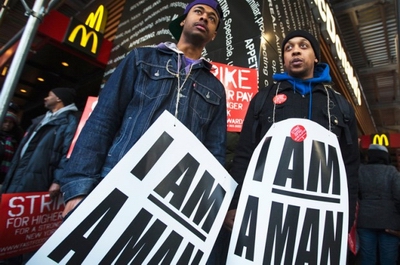
In the seventh major fast food worker walkout in eight weeks, fast food strikes Thursday will hit Seattle. Organizers expect a mid-morning walkout to including workers from restaurant chains like McDonald’s, Burger King, Taco Bell, Subway, Arby’s, Chipotle and more. The wave of strikes began with an unprecedented strike day in New York earlier this year, followed by similar coordinated actions in cities including Detroit and Milwaukee.
As Josh Eidelson reported for the Nation:
“I’m sick of seeing my co-workers and me essentially get pushed and pushed and barely be able to eat,” Taco Bell employee Caroline Durocher told The Nation Wednesday. “And I think it’s time that we pushed them back”…
The Seattle strike comes two weeks after New York’s fast food workers campaign released a report alleging rampant wage theft in the industry, and hours after the Congressional Progressive Caucus announced plans to MSNBC.com for a nationwide tour focused on low wages and economic inequality. It also follows a day-long strike last week in Washington, DC, staged by federally-contracted workers – federal building fast food employees included – demanding that President Obama take executive action to improve their working conditions.
…. The fast food strike wave represents organized labor’s most dramatic challenge to the massive, fast-growing, and virtually union-free industry. As I’ve written previously, fast food’s low-wages, precarious employment, and emotional labor are increasingly representative of the larger economy. The shape of the strikes – single-day walkouts, by aminority of the workforce, with an emphasis on community support – represents anincreasingly prevalent labor strategy for attempting to build worker organization, squeeze management, and avert retaliation, in the face of legal and economic changes that havemade strikes more risky and less effective.







